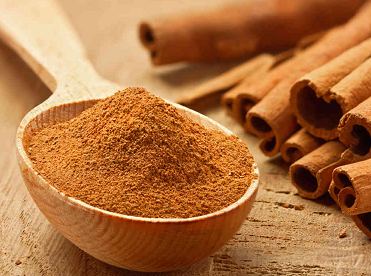There are two main types of cinnamon:
- Cinnamomum verum (Ceylon cinnamon), most commonly used in the Western world. The cinnamon from Ceylon is slightly sweeter, more refined and more difficult to find in local markets.
- Cinnamomum aromaticum (Cassia cinnamon or Chinese cinnamon), which originates from southern China, is typically less expensive than Ceylon cinnamon.
Contents
Benefits
- Cholesterol: One research study published in the September 2013 issue of “Annals of Family Medicine” concluded that consuming cinnamon in a dose from 120 milligrams to 6 grams per day was associated with reduced levels of total cholesterol, LDL cholesterol and triglycerides, along with higher levels of the good cholesterol, HDL. This study reviewed previously published, randomized controlled trials that studied cinnamon’s effect on glycemia and lipid levels.
- Antioxidant Content: The American Cancer Society notes that naturally occurring antioxidants in foods may provide some health benefits, including preventing certain cancers. Compared to some other antioxidant-rich herbs and spices, cinnamon has the third-highest antioxidant content — with only cloves and allspice containing more. A study conducted to evaluate the antioxidant activity of cinnamon extracts published in 2010 in “Nutrition Journal” determined that cinnamon prevented oxidation more effectively than the synthetic antioxidant, BHT. This suggests that you can use cinnamon as a natural antioxidant to prevent unwanted oxidation of lipids in foods.
- Type 2 Diabetes: The Diabetes Action Research and Education Foundation reviewed multiple studies that were studied to determine the effects of cinnamon on blood-sugar control in diabetics. Clinical trial findings suggest the possibility of a small-to-modest effect of supplemental cinnamon on diabetics’ blood sugar, likely because of small changes in insulin sensitivity. One study published in the December 2003 issue of “Diabetes Care” studied 60 people with type 2 diabetes. Researchers divided participants into six groups. Researchers gave groups one, two and three 1, 3, or 6 grams of cinnamon daily. Researchers gave placebos to groups four, five and six. After 40 days, the three cinnamon groups had reduced blood-sugar levels by 18 to 29 percent. Researchers did not see any significant changes in groups that took a placebo.
- Fungal infections: according to the National Institutes of Health2, cinnamaldehyde – a chemical found in Cassia cinnamon – can help fight against bacterial and fungal infections.
- Alzheimer’s disease: Tel Aviv University researchers discovered that cinnamon may help prevent Alzheimer’s disease. According to Prof. Michael Ovadia, of the Department of Zoology at Tel Aviv University, an extract found in cinnamon bark, called CEppt, contains properties that can inhibit the development of the disease.
- HIV: a study of Indian medicinal plants revealed that cinnamon may potentially be effective against HIV4. According to the study authors, “the most effective extracts against HIV-1 and HIV-2 are respectively Cinnamomum cassia (bark) and Cardiospermum helicacabum (shoot + fruit).”
- Multiple Sclerosis: cinnamon may help stop the destructive process of multiple sclerosis (MS), according to a neurological scientist at Rush University Medical Center. Cinnamon could help eliminate the need to take some expensive and unpleasant drugs.
- Lower the negative effects of high fat meals: Penn State researchers revealed that diets rich in cinnamon can help reduce the body’s negative responses to eating high-fat meals.
Cautions
- Cinnamon usually causes no side effects. Heavy use of cinnamon may irritate the mouth and lips, causing sores. In some people, it can cause an allergic reaction. Applied to the skin, it might cause redness and irritation.
- Very high quantities of cassia cinnamon may be toxic, particularly in people with liver problems. Because cinnamon may lower blood sugar, people with diabetes may need to adjust their treatment if they use cinnamon supplements. *An ingredient in some cinnamon products, coumarin, may cause liver problems. Given the lack of evidence about its safety, cinnamon — as a treatment — is not recommended for children or for women who are pregnant or breastfeeding.
- Dosing: Very high doses may be toxic.Because cinnamon is an unproven treatment, there is no established dose. Some recommend 1/2 to 1 teaspoon (2-4 grams) of powder a day. Some studies have used between 1 gram and 6 grams of cinnamon.
Interactions
- If you take any medication regularly, talk to your doctor before you start using cinnamon supplements. They could interact with antibiotics, diabetes drugs, blood thinners, heart medicines, and others.
References
- Source: Longe, J., ed. The Gale Encyclopedia of Alternative Medicine, second edition, 2004.
- Source: Natural Standard Patient Monograph: “Cinnamon.”
- Source: Memorial Sloan-Kettering Cancer Center web site: “About Herbs: Cinnamon.”
- Source: Nordqvist, Joseph. “What are the health benefits of cinnamon?”, web article, Reviewed by: Megan Ware, RDN, LD, registered dietitian and nutritionist. www.medicalnewstoday.com/

